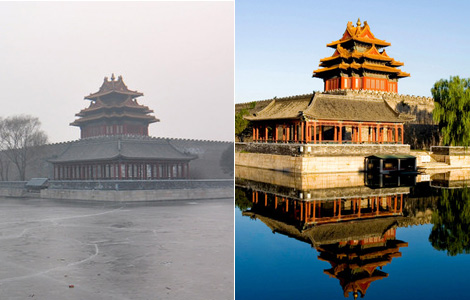For clean air, shift attention from GDP
Updated: 2013-12-10 21:08
By Li Yang (chinadaily.com.cn)
|
|||||||||||
The lasting nationwide smog is a sobering reminder for the Chinese government to reflect on its growth-oriented development model and urgently transform it, says an article of the 21st Century Business Herald. Excerpt:
In December, the smog has affected more than 100 big and mid-scale cities in 25 provinces in China, breaking a world record in terms of the territorial size affected the stifling air pollution.
After moving most of its heavy industries to neighboring Hebei province in 2008, Beijing learned the painful lesson that the smog is a regional issue, which cannot be solved by removing the factories.
Beijing used to target the automobile exhaust and even smoke from kitchen chimneys as the main air polluters.
But in the recent nationwide smog, some southern small towns and cities were also hit with serious air pollution, even if they don’t have many cars, or a lot of kitchen smoke or emissions from concentrated heating.
What is universal across the affected area is that the smog is widespread among industries that have heavy emissions.
Research shows that all of the heavily polluted areas in China this time overlap with the locations of heavy industries, such as cement, iron and steel, coking, electricity, chemical engineering and non-ferrous metal metallurgy.
After the financial crisis in 2008, the Chinese government's large-scale investment stimulus plan and local governments’ preferential policies for investment in heavy industries have increased the industrial density in not only the old industrial areas, but in new areas, such as the Yangtze River Delta, which did not have so much heavy industry before.
The planning and distribution of heavy industry in China are influenced by local governments’ economic policies and even trade protectionism. Each province has an industrial center of its own. The heavy industries, despite their low technological levels, scatter around the country with the blinded support of local governments.
The Communist Party of China Central Committee reiterated the necessity of revising the official assessment criteria to shift local governments’ attention from GDP to a more balanced and sustainable development model.
The recent smog urges the central authority to translate their rhetoric into concrete actions as the air pollution has already become a serious threat to the public’s health.
Related Stories
8 Liaoning cities fined for excessive smog 2013-12-10 19:18
Smog keeps foreign firm employees home 2013-12-10 17:10
China environmentalists slam inaction over smog 2013-12-10 11:15
Children in E China suffering because of smog 2013-12-09 21:04
Today's Top News
China opens key economic meeting
Retail sales up 13% in Jan-Nov
Kerry to visit Mideast, Vietnam, Philippines
GDP growth could hit 7.8% next year
Pyongyang sees major power change
Japan 'betrays' arms embargo
Toddler attacker should get rehab: experts
Environmentalists hail shark fin ban
Hot Topics
Lunar probe , China growth forecasts, Emission rules get tougher, China seen through 'colored lens', International board,
Editor's Picks

|

|

|

|

|

|





